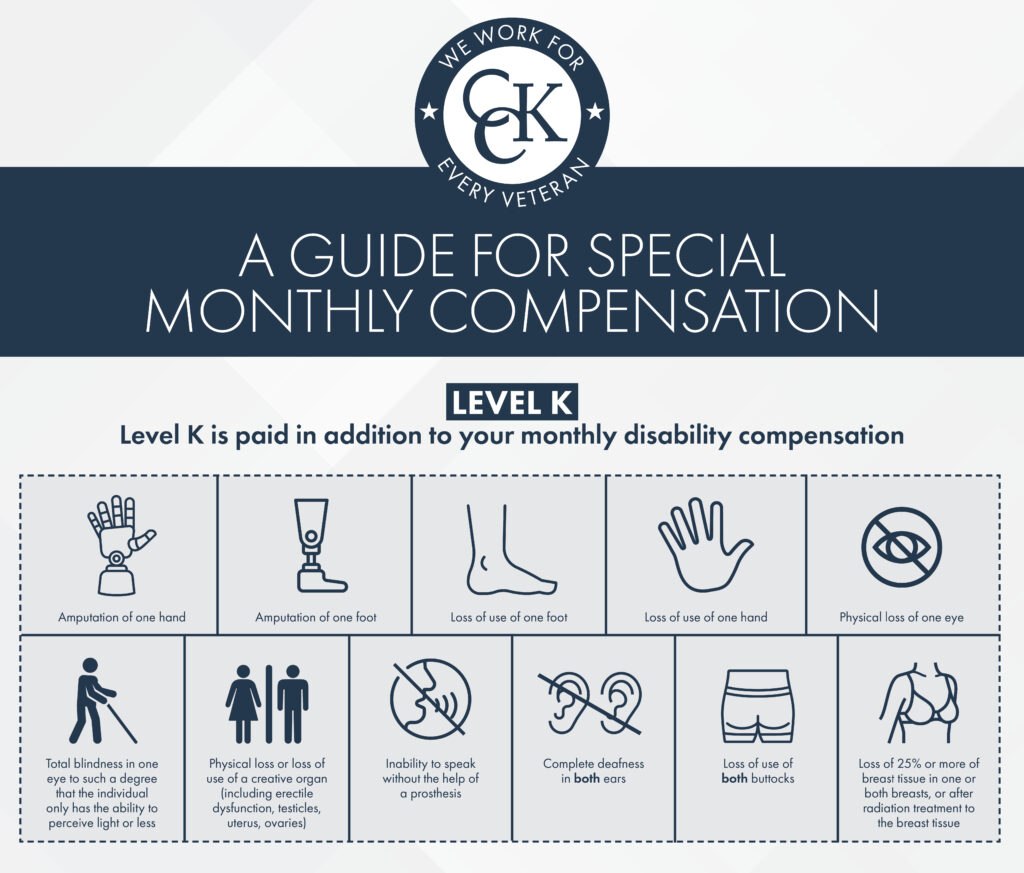Special Monthly Compensation Series: SMC(k)

CCK Law: Our Vital Role in Veterans Law
Special Monthly Compensation (SMC) is awarded to veterans with a service-connected condition, or a combination of service-connected conditions considered by the VA to be especially serious and debilitating. The severity of these conditions warrants higher rates of compensation above the schedular 100 percent.
Technically, you do not need to apply for SMC, as the VA should automatically award it to you during your claim process if you qualify. There are numerous levels of Special Monthly Compensation benefits depending on the nature of the disability, and the amount of compensation varies for each type. One such level is SMC(k).
In this blog, CCK Law will examine:
- The SMC(k) level of special monthly compensation
- The amount of compensation this level affords veterans
- The criteria required to qualify
Feel free to look over our overview of SMC to build some foundational knowledge before we dive into the details of SMC(k) below.
SMC(k)
The first level of Special Monthly Compensation that we will examine is SMC(k), which has a compensation rate of $139.87 per month for 2026. This encompasses loss (amputation) or loss of use of a body part(s) or function(s).
This rate applies to each body part lost, or that has loss of use, and can be added to other Special Monthly Compensation rates as long as your other SMC qualifying condition is not the same as your SMC(k) or the other rate is capped.

For example, a veteran’s SMC(k) rate is payable for each anatomical loss or loss of use of:
- One hand
- One foot
- Both buttocks
- One or more creative organs used for reproduction
In addition to:
- Blindness of one eye, whose functionality is only light perception
- Deafness in both ears
- Constant inability to communicate by speech
- Loss of breast tissue
Loss of / Loss of Use
An SMC(k) rating does not require amputation of a limb. Loss of use in the case of a hand or foot means that no effective function remains that is beyond the capability of an amputation stump below the elbow or knee with use of a suitable prosthetic appliance. This is determined based on the actual remaining function of the hand (i.e., grasping, manipulation of fingers) or foot (balance, movement, etc.).
As CCK Law partner Lindy Nash explains, “Typically, SMC-K is warranted for either loss or a loss of use of a body part or organ that a veteran has, due to their injury, loss the use of … [L]oss of use, it doesn’t have to be amputated, there is no amputation requirement.”
If a veteran experiences loss of, or loss of use of, a hand or foot due to military service, then a subsequent loss of the other due to non-service-connected circumstances, they will receive service-connection for both hands/feet. This law also applies to creative organs and eyes.

Call CCK Law Today
Special monthly compensation can be complex. While veterans should automatically be considered for SMC(k), this doesn’t always occur since the rules and regulations surrounding SMC are often poorly defined or misapplied by VA.
Since 1999, CCK Law has been helping veterans obtain these all-important benefits and may be able to help you, too. Call us today at (800) 544-9144 for a free case evaluation with a member of our team.
About the Author
Share this Post
